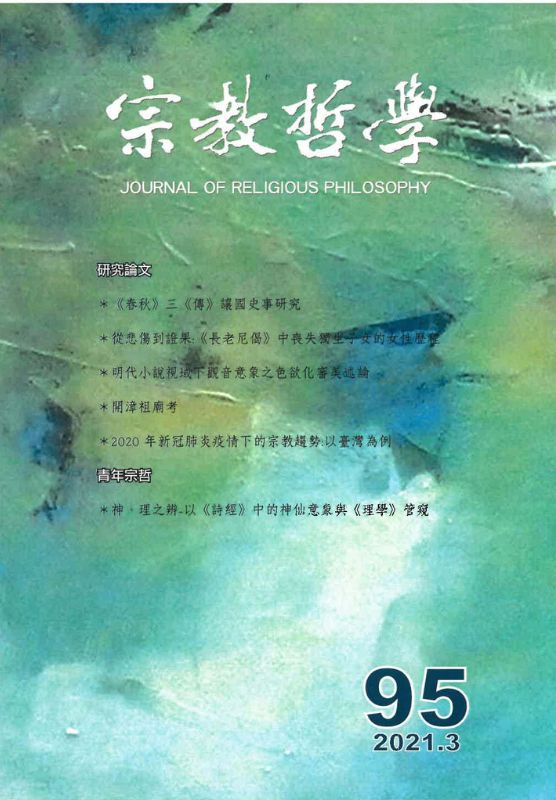
第95期
2021年3月
| 論文 | 作者 | 頁碼 |
|---|---|---|
《春秋》三《傳》讓國史事研究摘要
《春秋》三《傳》記錄讓國史事並不多,且國君或公子讓國的時空背景亦不相同。從三《傳》的記錄方式來看,對嫡子繼承制的堅持是讓國成立的關鍵。但從當事人的言論看來,個人的品德才能以及能否利於國家卻是形成讓國事件的主因。雖然最終結果通常都是嫡子繼承制得到勝利,但在讓國的過程中,亦表明春秋時代的嫡子繼承制度正受到衝擊而產生動搖。
| 諸葛俊元 Chuke, Chun-Yuan | 001-026 |
From Grief to Arahatship: The Process of Women Who Lost Their Only Child in the Therīgāthā從悲傷到證果-《長老尼偈》中喪失獨生子的女性歷程摘要
The purpose of Buddhism is to solve the problems of life, alleviate the suffering of human beings, and obtain happiness and liberation, and lamentation and separation from the beloved are counted among the universal sufferings of human existence. They are closely associated with death and bereavement, and happen to everyone. In general, the loss of an only child is the most painful and unbearable. How a mother confronted the passing of her only child
son or daughter and coped with loss and grief in the early Buddhist texts? How the Buddha helped them to pass through sadness? Actually, bereavement may be more than a negative experience, and may possess positive implications. It gives the bereaved an opportunity to transform themselves from grief to inner tranquility and enlightenment, and the assistance does not comprise giving mere comfort or support, but also emphasizes the proper understanding of impermanence and the causes of suffering. This paper is a textual, narrative and comparative study of the bereavement process in the three cases in the Therīgāthā and its commentary the Therīgāthā-aṭṭhakathā: Ubbirī lost her only daughter Jīvantī, Vāsiṭṭhī lost her only son, and Kisāgotamī lost her only son. It analyses and integrates the bereavement cases according to the structure of the Four Noble Truths cattāri ariya saccāni, the similarities and differences among the bereaved, the reactions, the processes of changes, and finally consequences are related and compared. How the Buddha led them realize the impermanence on their path from grief to arahatship arahatta is also essential. | 陳紹韻 Shao-Yun, Chen | 027-070 |
明代小說視域下觀音意象之色欲化審美述論摘要
在明代中後期小說中,觀音意象的普遍色欲化,主要體現在兩個方面:一是世俗性的色欲化,一是宗教性的色欲化。在世俗性的色欲化中,觀音意象常常以世俗審美中的人間美女肉身出現,並公然成為色欲消費對象;在宗教性的色欲化中,觀音意象常常以宗教捨身度人的菩薩化身面目示人,亦於有意無意的暗示中成為無可奈何的色欲諧謔目標。而究其背後的隱喻則有四:其一,隨著中國佛教信仰中的觀音意象的女性化完成,其三十二相好便隨緣為世俗審美的比照以至被仰慕或覬覦,同時,佛教固在的染欲修道理念很早即於小說中藝術化為某種母題,此為色欲化的宗教因緣;其二,明季中後期,社會個性自由與解放風尚昌盛,小說中的觀音意象普遍色欲化不過是其流風所及的另類表達之一而已,此為色欲化的社會因緣;其三,明季中後期,男性審美的女性化喜好風行,在有功於觀音意象女性化的定型的同時,亦因之消解了觀音意象審美的性別區隔而成就了其雙性標本價值,此為色欲化的性別審美因緣;其四,佛教神聖性消解下的反權威、反禁欲之明季文學中觀音意象的個案演異,此為色欲化的文學因緣。
| 王水根 Wang, Shui-Gen 傅琴芳Fu, Qin-Fang | 071-113 |
開漳祖廟考摘要
圍繞陳元光閩南故居燕翼宮出土的清嘉慶二十三年(1818)《重修開漳祖廟裔孫捐銀名次碑記》,運用歷史人類學的研究方法,深入考察。從中發現燕翼宮曾被陳元光後裔尊稱為“開漳祖廟”,既是陳元光故居,在宗族社會時期又成為陳元光後裔的宗族總戶所在地,由於陳元光“亦神亦祖”的性質而成為陳元光後裔祭祀“清漳陳氏鼻祖”陳元光的家廟。從而揭示了陳元光的最早祠廟,首次考察陳元光家廟,為新時期碑銘研究提供新的路徑。
| 劉濤 Liu, Tao | 115-130 |
2020年新冠肺炎疫情下的宗教趨勢:以臺灣為例摘要
對許多人來說,信仰是生活的動力來源之一。人類面對未知(uncertainties)和困難,尤其對「死」感到不明或恐懼之時,進而冀求宗教的支持與力量,當然宗教的功能不僅止於此,但是安頓人心、人生,並進而轉化為進步的動力,宗教更有其貢獻。本文以公元2019年底發生的新冠肺炎疫情為例,以文獻研究法收集公元2020年相關疫情與宗教相關文獻,說明疫情變化與人類對於宗教之需求、行為之間的關係,並探討今後宗教的可能趨向與面對之問題。本文最後,總結未來的方向作為結論:1.守得住,回歸宗教本義:更確認身、心、靈整合的重要性,宗教的既有的優良傳統仍需保存,發展得以有據。2.轉得開,模式發展創新:人類借助科技工具使心靈的連結、安頓與成長,將更為無遠弗屆。
| 沈明昌 Shen, Ming-Chang | 131-141 |
神、理之辨以《詩經》中的神仙意象與《理學》管窺摘要
看到「神」字,會讓人聯想到神仙、神人與神話傳說……,對於「神」字的原始內涵與「神仙」的概念,是來自於何種思維?《詩經》是陸續編輯成的一部中國最早的詩歌總集,在《詩經》中己經出現了「神」字與「仙」字且「神仙」形象已經可見。此點,意味著「神仙」思想的萌芽早在《詩經》的時代便已開始形成。「理」的字源與內涵起於何時?程朱「理學」經過「義理」內涵及發揮,將「理」的內、外在深層意義又推向何處?在了解「神」、「理」二個字的深層含義後,有助於一窺先人對於「神仙」思維的意象,以及成為「神仙」後,將歸往何處的「大生命」論題。
| 桑美玲 Shang,Mei-Ling | 143-163 |





